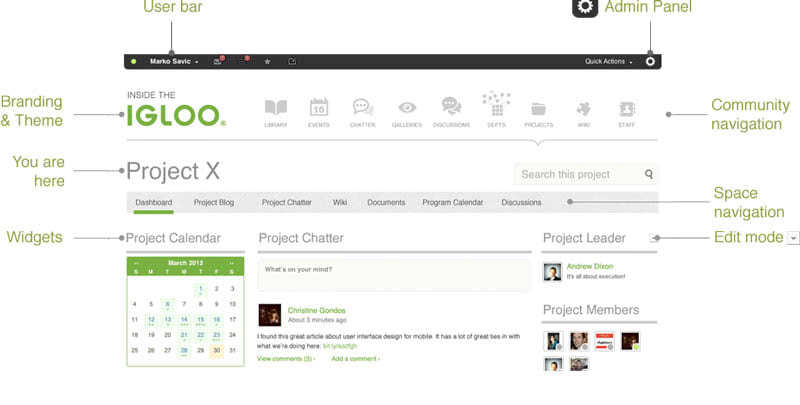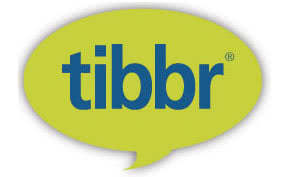Enterprise Social
Build a Digital Workplace in the Cloud with Igloo Software

Think of your company’s knowledge management system–does it invite social collaboration across the enterprise? Have you ever even thought about it as a tool for that purpose? If you answered no to those questions, then Igloo Software has a solution it wants to sell to you. We sat down with IGLOO’s Stephen Rahal to ask some questions about how enterprise social can make good on the promise of boosting productivity and helping accomplish tasks.

WEBSITE: www.igloosoftware.com
FOUNDED: 2008
LOCATION: Kitchener, Canada
CUSTOMERS: IDC, Kimberly-Clark, Synnex Canada
What was the inspiration behind Igloo Software? What sort of specific business needs did you see that you could address better than the competition?
The concept for Igloo Software actually started back in 2004 in the Waterloo-based think tank called the Center for International Governance Innovation. They had just launched an initiative to bring together the world’s greatest minds to share research and ideas on global governance issues. What was noticed at the time was that email was a really ineffective tool for the researchers to work together. What they did was build a platform to be able to facilitate interaction around working paper and exchanging research ideas.
The platform was so successful in bringing together this group that in 2008 the idea was actually spun out into a for-profit company called Igloo. Today we have over 250 customers and 4,000 communities around the world, but all of it stil lbased around that basic premise of bringing people together who are in different locations to promote better collaboration.
You describe your product as an SaaS intranet for clients. Would it be accurate to describe it as a combination of content management system (CMS) and enterprise social platform? If not, how would you describe the services you offer?
We do think of ourselves as a modern intranet platform in that we can be used to support both internal communication and internal collaboration, but also engaging, connecting and collaborating with people who are outside of the organization, whether they would be customers or partners. For us next-generation intranet crosses those boundaries.
What we’re bringing together are three core capabilities: content management or document management, communication as well as collaboration tools. Social is more and more not a platform in and of itself; social is becoming a part of all software applications. We are a complete suite, and we bring together all these different ways in which you can exchange ideas and collaborate together–blogging, micro blogging, file sharing, forum capabilities for discussions, Wikis for building a knowledge base. You have all these technologies packaged up in one software suite, and that’s what Igloo is.
What’s the market like for solutions like Igloo? Do many organizations recognize the need for a collaboration platform, or is it still an uphill battle in educating a lot of prospective clients?
There’s a huge uptick in interest around social business software. If you look at some of the analysts they’re saying that the social business industry is set to hit a value of $6.4 billion by 2016. At 61 percent compound annual growth it’s growing extremely rapidly. More and more people are adopting social applications. But if you look at something like the recent McKinsey & Company study around social technology, only 3 percent of companies are fully networked to be able to embrace these technologies at a level that will transform their business. So although it is being adopted quite rapidly, there’s still a long ways to go in terms of full adoption.
Could a reason for 3 percent figure you mentioned be potential conflicts between services like Igloo and pre-existing software deployments like Dynamics or SAP Business One?
If you look a those tools, whether you’re talking about ERP or CRM or ECM, there’s still a tremendous amount of work that happens outside those applications. You don’t spend all your time within an ERP application or CRM application. There’s things you need to do outside those applications, whether it’s collaborating on documents or finding experts or finding research information. You can’t really accomplish those within an ERP system. So a significant portion of your day is still spent outside those applications, and you need a way to be able to accomplish some of those tasks.
Some of these applications are adopting social features, but they were originally designed as databases never intended for that. They’re not built for collaboration. It’s difficult to socialize and enable communication within an application that was really built to be a data warehouse or database. Our current systems fall short in dealing with the spontaneous and ad-hoc nature of knowledge-based work. In fact, according to IDC, information workers spend on average less than 70 percent of their time working around rigid systems. Igloo is a solution that is built for facilitating this type of work–collaboration around documents, the sharing of status updates, the communication of policies. Enterprise platforms that were built to manage transactional data just aren’t suited for that type of work.
Tell us a little bit about the Q release you put out last November.
From a release perspective we release new updates to all of our customers on a pretty rapid release cycle, on average around every 90 days. With Q in particular what we wanted to do is enhance the experience for the end-users because right now it’s less about adding new features or new social applications. It’s more about enabling really specific business processes.
With Q that starts with email integration. We wanted to establish a better way to get content trapped in your inbox into a community environment. Email is the number one “social network” out there. There are more people on email platforms than there are on Facebook, so one of the challenges is getting around email’s very nature–it’s a one-to-one messaging system that creates silos. When you use it for collaborating around documents it becomes very inefficient. With our email integration we provide a simple way to take those conversations happening in email and quickly forward them into your community. Say you sent me a file attachment and I wanted to review and collaborate around it with multiple people outside of our initial email conversation. I could easily forward that document because each folder within my community is going to have its own custom email address.
We also had a release called Pearl which just happened a few months before, and that’s really interesting as well. One thing we’ve introduced is the whole concept of social analytics. What we’ve done with that is form a partnership with MicroStrategy and their business intelligence platform. What it allows us to do is actually report on participation and activity engagement within your intranet or within your community, so you can go and look at who your key influencers are, better understand how people are sharing and collaborating and provide a rich set of metrics related to said engagement so you can better understand what’s happening as a community manager.
That’s fascinating since we mostly hear about social analytics being applied to outward-facing platforms like Twitter, but rarely if ever is it turned towards internal communications.
Yeah, when people hear that term right now they always think about external social networks and their focus on branding and measuring brand sentiment. One of the things internal social analytics can do for you is create visibility around how people work and interact across the organization. So for the first time with social analytics you’re able to better understand how teams work together.
Just think about the potential related to that. Take a high-performing team versus a low-performing team and compare their work tendencies, how they share information. In sales you can compare reps not just by their closure rates, but how they connect to other people in your organization through our member dashboard feature. I think one indicator of potential effectiveness for a sales rep is someone who’s well connected not just to the others in his department, but across the organization–product marketing, corporate communications and professional services, because as a sales rep one of the primary challenges right now is getting the right information to customers at the right time. the person who is more well connected across the organization has more resources to tap into to accomplish that more effectively.
Have you noticed any strong correlations in terms of the sorts of organizations using Igloo?
We really attract customers across all industry segments. We have customers in financial services, in technology, in healthcare and manufacturing and telecommunication, not for profit even academic organizations so it really crosses the spectrum in that sense. Obviously, technology organizations are drivers in social business adoption. Some of the more regulated industries are little bit slower to adopt just based on sensitivity related to information sharing and security related issues.
In terms of business size Igloo really focuses on small and mid-size organizations. If you look at our product and services there are two reasons we’re appealing to this segment: first, the economics are compelling. Being a SaaS solution there are no hardware costs, no maintenance costs. You don’t have to worry about updates, patches and fixes. The other thing is flexibility and scalability. It’s very easy to start small and grow as your organization grows, and that’s very attractive to fast-growth mid-size businesses. More and more we’re also working with larger enterprises, business units within larger Fortune 500 companies. Companies like NI Holdings, which operates the Nextel branding in Latin America; Aetna, a major insurance company; RSA, a division of EMC. For large businesses the whole promise of social is the ability to work in a more agile fashion to respond to market changes more quickly. They want to have that soul of a startup. It gives them the speed of response they don’t get with traditional platforms.
What is the biggest challenge you’re currently facing and how are you addressing it?
I think one of the biggest challenges we face is that there are more and more larger enterprise software companies entering the space. For us it’s an awareness issue, just having people be aware of what our solution is capable of. IDC published a report on the business enterprise collaboration space not too long ago which looked at the entire enterprise social space, including the larger platforms you mentioned earlier like SAP, IBM and Microsoft as well as Salesforce.com. Set against those larger names Igloo actually had the best overall solution capability rating from the respondents. So when people are aware of our solution they can see the power of it, but the obstacle we face is making them aware.
What kind of year is 2013 going to be for Igloo and enterprise social in general?
For 2013 I think you’re seeing a bit of a shift. In the early days in was really about these new social applications, blogs, Wikis, the applications themselves. Now more and more it’s about moving towards looking at getting work done. A lot of social vendors that we look at in the market focus on the sort of ad-hoc spontaneous nature of social, activity streams to have serendipitous connections and being able to see what other people are working on.
But for us we’re really focusing more on structured collaboration. One of the capabilities we’re introducing is the whole concept of social task management. It’s less about using this to connect into networks, but more about using social to help manage how we get work done, because at the end of the day as information workers we still collaborate around documents. We have task lists and milestones that you have to achieve and so more social to be a docket, more fully across organizations has shift to more structured and organized. More structured collaboration is really a trend that we see developing and the trends around what I talked about on social analytics.
Want to learn more about Igloo Software or other enterprise social platforms? Download the Top 10 Enterprise Social Software report to compare top solutions side by side.







